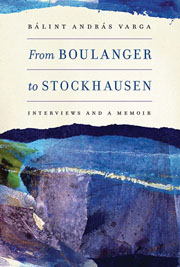Book contents
- Frontmatter
- Dedication
- Contents
- Foreword
- Acknowledgments
- Part One Interviews
- Part Two A Memoir
- Introduction
- Chapter 1 Ancestors
- Chapter 2 On Being Jewish
- Chapter 3 Growing Up in Postwar Socialist Hungary
- Chapter 4 Margit
- Chapter 5 Tapespondence
- Chapter 6 Birth and Demise of a (Counter)revolution: A Boy's-Eye View
- Chapter 7 Broadcasting 1
- Chapter 8 Broadcasting 2
- Chapter 9 Editio Musica Budapest
- Chapter 10 Interviewing: An Obsession
- Chapter 11 Ich war ein Berliner
- Chapter 12 Moving to Vienna
- Chapter 13 Universal Edition
- Chapter 14 Back Catalogue
- Chapter 15 The Psychology of Promotion
- Chapter 16 Farewell and After
- Notes in Retrospect
- Index
- Miscellaneous Endmatter
Chapter 14 - Back Catalogue
from Part Two - A Memoir
Published online by Cambridge University Press: 05 January 2014
- Frontmatter
- Dedication
- Contents
- Foreword
- Acknowledgments
- Part One Interviews
- Part Two A Memoir
- Introduction
- Chapter 1 Ancestors
- Chapter 2 On Being Jewish
- Chapter 3 Growing Up in Postwar Socialist Hungary
- Chapter 4 Margit
- Chapter 5 Tapespondence
- Chapter 6 Birth and Demise of a (Counter)revolution: A Boy's-Eye View
- Chapter 7 Broadcasting 1
- Chapter 8 Broadcasting 2
- Chapter 9 Editio Musica Budapest
- Chapter 10 Interviewing: An Obsession
- Chapter 11 Ich war ein Berliner
- Chapter 12 Moving to Vienna
- Chapter 13 Universal Edition
- Chapter 14 Back Catalogue
- Chapter 15 The Psychology of Promotion
- Chapter 16 Farewell and After
- Notes in Retrospect
- Index
- Miscellaneous Endmatter
Summary
The catalogue of a music publisher is an important document of the state of musical creativity at any given time. It also reflects the wisdom or otherwise of the conclusions drawn from it by the firm's decision makers.
If you put yourself in the position of Emil Hertzka and his colleagues and successors, I think you cannot but approve of their artistic policy. Unblinkered by stylistic preferences, they cast their net wide within Europe (later also as far as the United States, Canada, Japan, China, and Australia) and invited to Universal Edition a great many composers who were established figures with numerous performances (such as Alfredo Casella, Gian Francesco Malipiero, and Walter Braunfels) or bright young ones born around 1900 who were writing fashionable music—perhaps music of the future (such as George Antheil, Wilhelm Grosz, or Alexander Mossolow).
Luckily, they put their bets on other figures as well who have actually made it into the canon. It is well-nigh impossible to foretell who will one day count as a classic. May I refer you to the interview with Sir William Glock: he relates how it was not until 1958, forty-seven years after the composer's death, that the BBC launched a Mahler Renaissance in Britain by programming all the symphonies twice over. However late in coming, the proof of Hertzka's faith in Mahler was eventually delivered.
In the 1960s in Budapest, when Claudio Abbado invited me to his performance of the Second Symphony, I declined by saying that it was too long.
- Type
- Chapter
- Information
- From Boulanger to StockhausenInterviews and a Memoir, pp. 364 - 369Publisher: Boydell & BrewerPrint publication year: 2013



